Cursing the Blessed Mountains
on road trips, memory, national parks, and healing

The funniest part is I hate the mountains. Imagine having altitude sickness at 4,000 feet (1219 meters). It’s embarrassing. I feel my absolute best at or below sea level. I’m built to stick close to the shore, to reside in coastal states, to trek low-level deserts. However, I feel better after spending time in the mountains. After the sickness, the misery, the exhaustion, comes energy, calm, and a will to live. I go to the ocean with its littoral zone and dunes to find immediate peace and remind myself life is not just nice but beautiful and worthy. I go to the mountains to then return home with the antidote to unwarranted meltdowns, to manage the overload of noises and information.

But what happens while on the mountains?
I feel slow, tired, irritable — simply miserable and miserable to be around. The first time I went camping on a mountain I didn’t know I was at 8,274’ (2531.9 meters). After driving for two days from the east coast, sleep deprived and basing decisions on a plan already abandoned thanks to a rain-soaked mountain sitting beneath lightning, in my mind I had to find another campground to get some sleep before moving further west. It made sense at the time to drive to the Great Sand Dunes National Park. In hindsight, the rational choice was finding any hotel once it was clear to me I would be driving in the night for hours and hours. But what I wanted was adventure and to satisfy the self-destructive urge I will never shake.
After driving through more of the darkness that was still unfamiliar, forced to accept I could only see as far as my headlights allowed, surprised that I could see towns only as grids of light – a piece of the night sky laid down and rerouted, slowing down for hares and kangaroo rats (spotting them fulfilled a childhood dream), and praying my car didn’t sit too low to handle the unpaved section: I was at the campground.
It was to0 cold to step out and my down coat just enough to keep me warm. I fell asleep with the wind screeching, scrabbling at the seams of the car, abundance of stars visible through the slowly fogging window. I saw the milky way and felt peace.

The morning air chilled down into my joints, rendering them stiff, but I was able to eat a warm meal and explore some of the terrain on the side of the trickling Medano Creek, splashing within it. The creek flowed clear and crisp; smoothly chatty and rushed. I spotted beetle tracks and coyote prints. Shadows of the hurried clouds slipped rapid over creases and curves of the dunes; clouds nearly touching the fragile peaks. The awe at the sight of them remains even thousands of miles away. However, it wasn’t enough to distract from the nausea, headiness, or my slow-moving limbs as if wading through molasses. Yet I would suffer again gladly to return to climb to the peak of Star Dune.
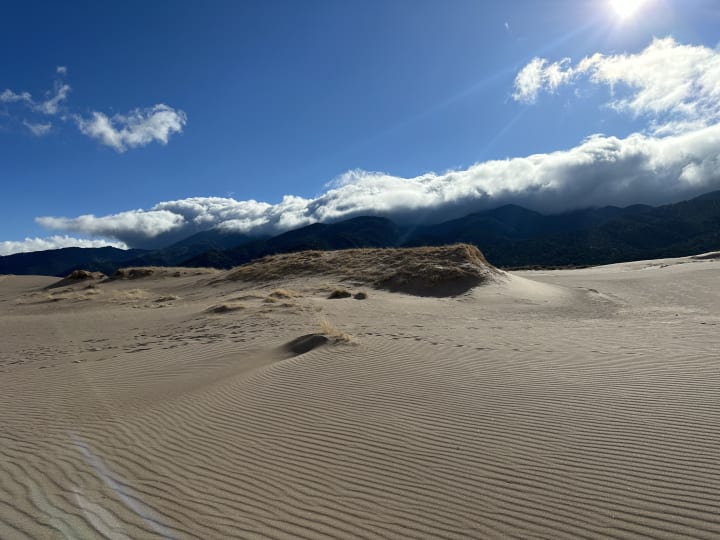
How my mama would love this. How my dad would’ve appreciated it. Only one of them can still experience this. This thought would return again and again the rest of the road trip and the drive back east.
The only time the thought hadn’t crept up on me was while driving over the San Juan Mountains, close to 11,000’ (3352.8 meters) above sea level, while I kept focus on pin-drop turns and not getting too close to the rail-less sides of the road, where the alpine trees grew out and up from the chiseled mountain sides with snow still clinging on in the middle of May.

I had a meltdown at the Grand Canyon at the South Rim. I was on a looping road trip with a friend, having gone from Las Vegas to Death Valley, to the Pacific Ocean then onto the Angeles National Forest, driving to Joshua Tree National park (where a coyote crossed my path), then finally the Grand Canyon before we would head back to Las Vegas to her home and dogs. We had gone up and down, down and up. Finally, I just couldn’t take it anymore. But she calmed me down and I did my best to not ruin the rest of our time there. And we did have fun. We watched the sunset over a cliffside from a ledge. I had near the same feeling I do when standing before the ocean, small and at peace in my smallness in this world.


It was a difficult drive out of Arizona. Exhausted, sleep deprived, dehydrated, overloaded with unhealthy foods, we had to pull off to sleep for a bit before making the rest of the drive. The highway rush that felt closer than it ever had, yet further than I was used to, made it difficult to let go of vigilance in order to fall asleep. The sky was not clear here, but still I could see the stars clear through the windshield. I knew I would miss the clarity of the desert skies and the true darkness that came with it.
After some time in Vegas —with a night out and a photoshoot in Red Rock Canyon— it was time to go. I pushed myself yet again, determined to visit Zion and then White Sands after a night in the Guadalupe Mountains. I drove through the night, through the desert, through the Navajo Nation reservation. I passed a dead coyote before a coyote crossed my headlights’ path on the road winding through the desert during the witching hour. Five minute naps and songs on loop got me through. I watched the sun rise over the highway in New Mexico. I didn’t make it to the mountains.
Accepting that I could not arrive before checkout for a very crucial few-hours sleep, I rerouted to the the White Sands National Park. I was tired of mountains.
It was a worthy stop and unlike anything I had seen before. But I was still above 4,000’ (1219.2 meters) for much of this state and I couldn’t get out fast enough. I missed the east coast in all its lush glory, at lower elevations which didn’t make me sick and didn’t make me cry (usually). I missed the ocean and soft sands, unlike the packed desert sand and these desert dunes which didn’t yield as freely as the coastal dunes.

Homesickness hit me at its hardest as I looked across the pristine, blinding white dunes, to the distance where the hazy mountains —blurring into the sky– were peeking through piles of fine grain gypsum looking almost as the ocean that connects with the shore and all I had to do was cross the dunes to get to it. But so packed the sand it barely gave way to my boots, so bright it was painful without shades and still bit with them on; so different from the places I frequent. All I could see now were the differences: from the textures to the creatures to the flowering yuccas at every turn you take.
I wanted to breathe in salt air. I wanted my mother. I wanted to go home.


Unfortunately, I needed sleep still and I couldn’t make it to lowlands anytime soon. I had to sleep in the Lincoln National Forest where the elevation wasn’t lower and the temperature would drop below 40F (4.5C) that night. I had to pack up in the dark before dawn after having, finally, slept solidly for 8 hours. At least now I could make it physically; emotionally, I knew I would have hours with myself to myself which was fine but tiring.

I realized I needed the time on the way to explore new places to think of things in my life, to cry over my dad while thinking of what we would have talked about had he not gotten sick and was still around. I realized I needed that time in the car while driving through the Rocky Mountains, listening to Lana Del Rey and the plaintive refrain “Daddy, I miss them / I’m in the mountains / I'm probably running away from the feelings I get / When I think of all the things about them,” realizing how deep it cut that I was robbed of a coherent father in late childhood and now he’s no longer here. I take that pain and hurt and tears with me up and up, higher and higher; quiet passenger in my car, silent companion in my tent.
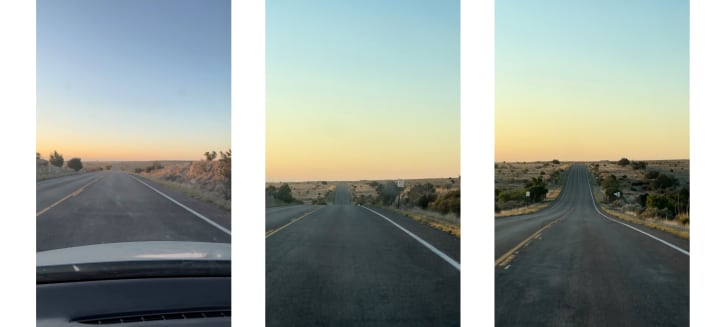
Grief isn’t linear or sensible, nor is this self-directed treatment comprised of suffering-at-altitude in order to handle my life. I take the memories and questions, the past and the lost future, to consolidate while chemicals and neurons recalibrate. Life is suffering, but in balance to tranquility; the ugly lives alongside beauty — we can’t have one without the other in mutually parasitic relationship.

And so, after a few more stops made to recuperate and sleep along my route, I made it home. I had made my epic American road trip just as I had been dreaming of since I was a teenager. I set foot in several of the national parks I had grown up seeing in the glossy pages of National Geographic magazines. I carry the experiences with me, the profound and the mundane, the ecstatic and the painful. I had found, at last, the most productive and happiest way to satisfy that sick desire to self destruct. I’ve long accepted this desire will be a part of me always, but was nervous of what I would need to do to appease it.


I’ll get back out west, eventually, to see the Tetons and cry as I drive through them with Modest Mouse on the stereo. I’ll see the mountains of the Pacific Northwest and stop at the sea, explore the Oregon dunes, sleep on the beach by the Pacific Ocean.
For now, I am on the east coast and appreciating the dips and turns and plant-clotted views. I slowly trek the sands of Cape Cod. I walk sections of the New England Trail. I touch on the Appalachian Mountains range. I plot my course to the Great Smoky Mountains and the bayous of the south. I have big plans for the national seashores, meaning I’ll be trudging along bobbing, curving dunes and through hissing surf. I’ll have my mama with me; sharing some of the same dreams and spending the time we have.
I’ll make it back out to the west coast, but, for now, I still belong to the Atlantic.
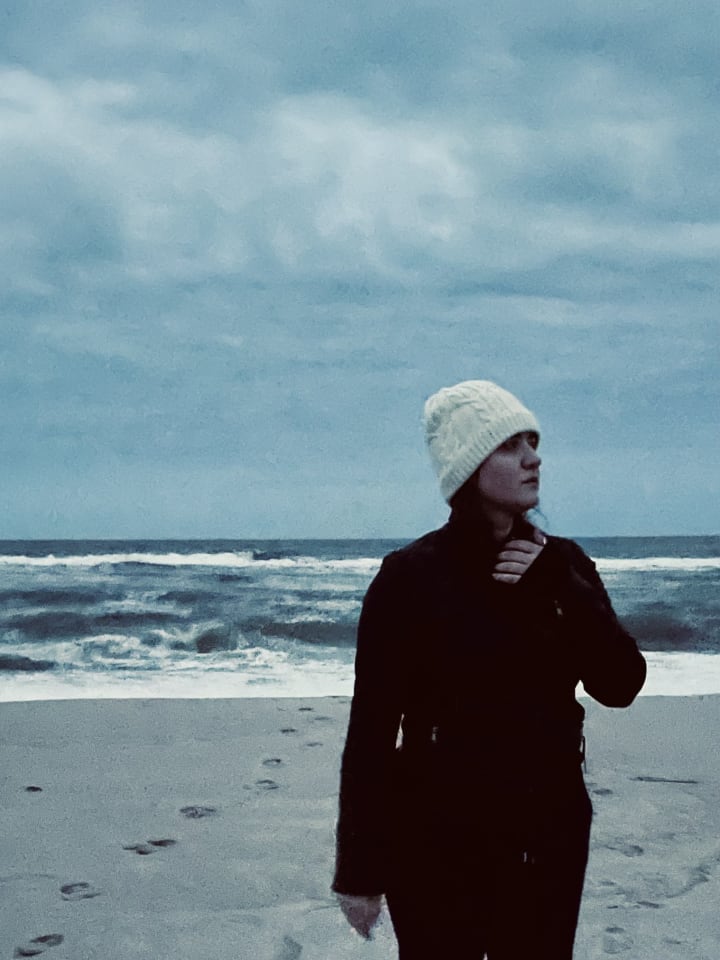
…………………………………………………………………………………………………………….
A big thank you to my wonderful and gorgeous friend who was with me for our southwestern road trip. She braved the heat on the Mesquite Flat Dunes in Death Valley then climbed around in heels in Red Rock Canyon as my model in both locations, kicking off my analog photography narrative project.

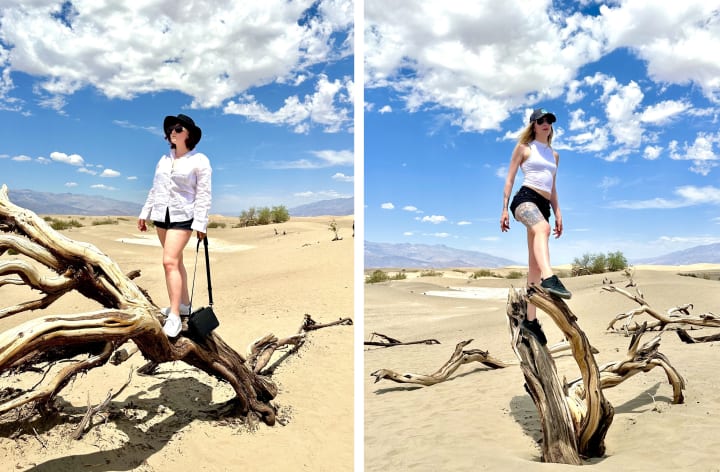
…………………………………………………………………………………………………………….


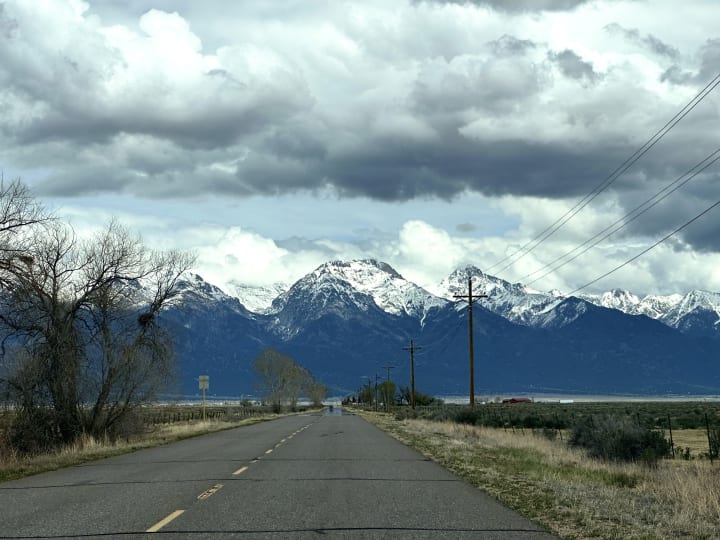
…………………………………………………………………………………………………………….
Thank you for reading. A tip is not expected but is always appreciated. All support is appreciated. Thank you for being here.
Check my other writing related to the topics and themes from this piece:
Bogue Chitto Wildlife Refuge, a Louisiana Bayou in Polaroid: beautiful weather in a beautiful swamp
Falling Apart in the Great Outdoors: disability, art, coping, and generational connections
Life after an eating disorder: the never-ending process
Long Way from the Atlantic: From sea to lake and back again
All images are original and property of Chaia Levi except where noted with permission.
About the Creator
Chaia Levi
like if Nabokov had a brain injury
artist, writer, photographer
instagram, tiktok, tumblr: @chaialevi


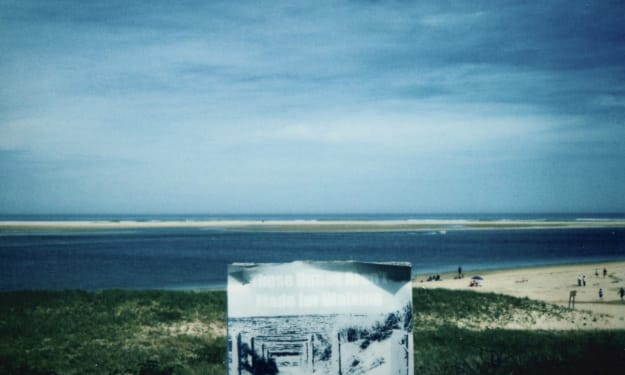



Comments
There are no comments for this story
Be the first to respond and start the conversation.